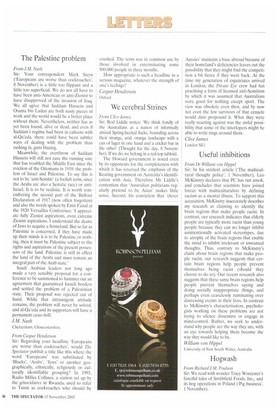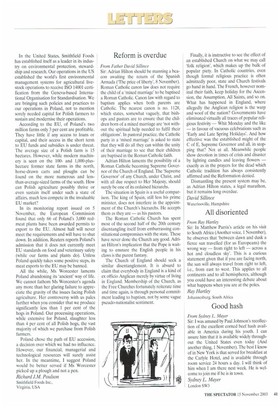Hogwash
From Richard JM. Poulson Sir: We read with wonder Tracy Worcester's fanciful tales of Smithfield Foods, Inc., and its hog operations in Poland ('Pig business', 1 November). In the United States, Smithfield Foods has established itself as a leader in its industry on environmental protection, stewardship and research. Our operations in the US established the world's first environmental management systems for agricultural livestock operations to receive ISO 14001 certification from the Geneva-based International Organisation for Standardisation. We are bringing such policies and practices to our operations in Poland, not to mention sorely needed capital for Polish farmers to sustain and modernise their operations.
According to the EU, of Poland's two million farms only 3 per cent are profitable. They have little if any access to loans or capital, and their access in the short term to EU funds and subsidies is under threat. The average size of a Polish farm is 15 hectares. However, while modern machinery is seen on the 100and 1,000-plushectare former state farms in the north, horse-drawn carts and ploughs can be found on the more numerous and lessthan-average-sized farms of the south. How can Polish agriculture possibly thrive or even sustain itself under such a state of affairs, much less compete in the invaluable EU market?
In its monitoring report issued on 5 November, the European Commission found that only 66 of Poland's 3,000 redmeat plants have been awarded permits to export to the EU. Almost half will never meet the requirements and will have to shut down. In addition, Reuters reports Poland's admission that it does not currently meet EU standards on food and veterinary safety (while our farms and plants do). Unless Poland quickly takes some positive steps, its meat exports to the EU may be banned.
All the while, Ms Worcester laments Poland abandoning its 'ancient' way of life. We cannot fathom Ms Worcester's agenda any more than her glaring failure to appreciate the gravity of the issues facing Polish agriculture. Her controversy with us pales further when you consider that we produce significantly less than 1 per cent of the hogs in Poland. Our processing operations, while extensive for Poland, slaughter less than 4 per cent of all Polish hogs, the vast majority of which we purchase from Polish farmers.
Poland chose the path of EU accession, a decision over which we had no influence. However, our financial, managerial and technological resources will surely assist her. In the meantime, I suggest Poland would be better served if Ms Worcester picked up a plough and not a pen.
Richard J.M. Poulson
Smithfield Foods Inc., Virginia, USA



























































































 Previous page
Previous page